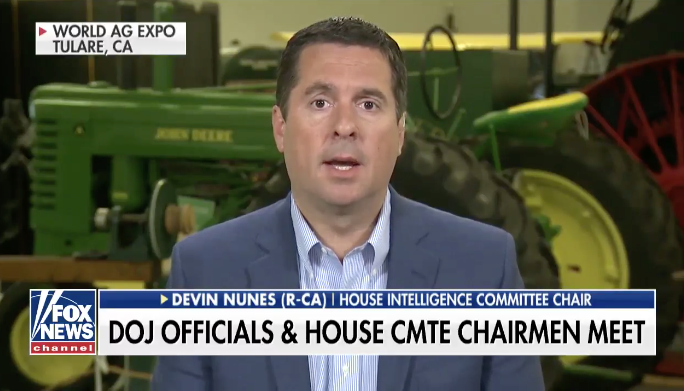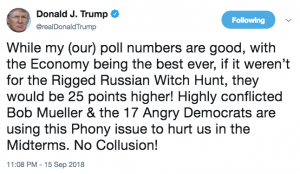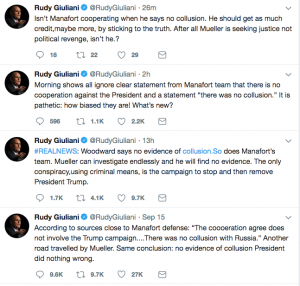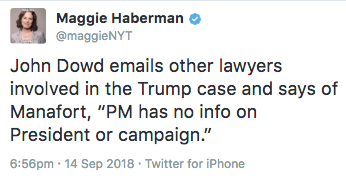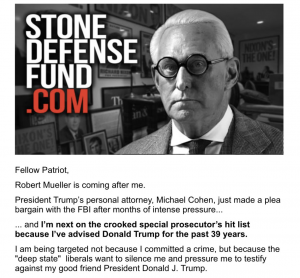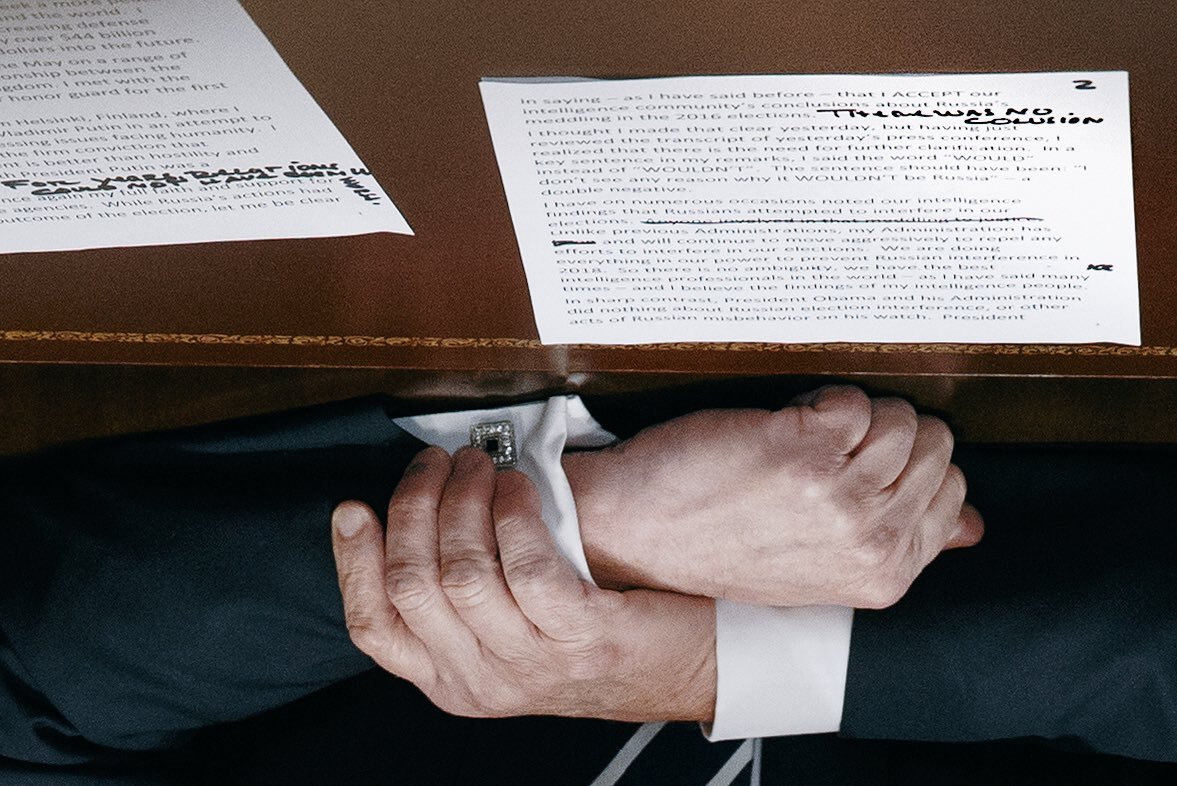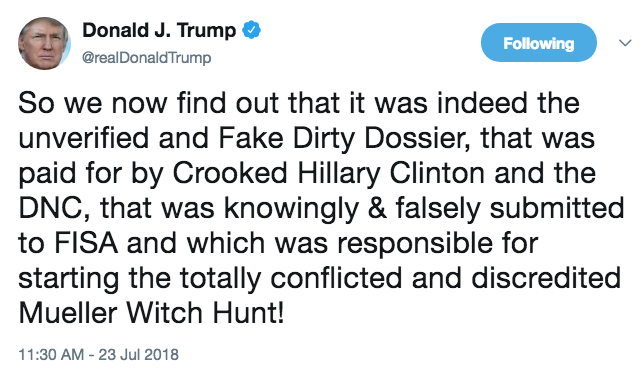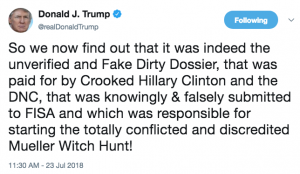On July 15, 2017 — a week after the June 9 meeting was reported in a NYT story publishing the first of numerous White House statements attempting to explain the meeting — Rhona Graff sent Rob Goldstone an email (PDF 44). With only a garbled (perhaps autocorrected) explanation, she forwarded back to Goldstone an email Goldstone himself had sent her the previous November, attaching some talking points from Natalia Veselnitskaya about Bill Browder and the Magnitsky sanctions (for a copy of the talking points, see PDF 37 ff).
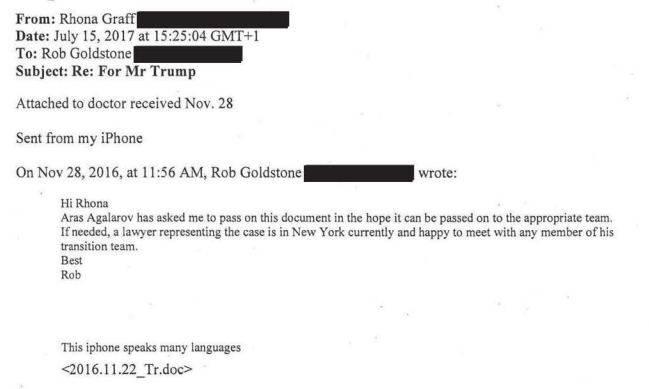
A week after the White House had first issued a statement saying, in part, “there was no follow up” on the June 9 meeting, Trump’s Executive Assistant was sharing with Goldstone a paper trail showing that there had been.
Rudy gets all the facts about the June 9 meeting wrong, again
That’s an important detail that gets missed every single time the punditocracy deals with attempts by Rudy Giuliani or his client to spin the June 9 meeting, as has happened in the wake of this TV appearance by Rudy on Meet the Press.
RUDY GIULIANI:
Well, because the meeting was originally for the purpose of getting information about, about Clinton. The meeting turned into a meeting —
CHUCK TODD:
Which in itself it’s attempted collusion. I understand —
RUDY GIULIANI:
No it’s not.
CHUCK TODD:
You just said it. The meeting was intended to get dirt on Hillary Clinton from a criminal lawyer.
(OVERTALK)
RUDY GIULIANI:
No, it wasn’t. No, no.
CHUCK TODD:
That was the intention of the meeting, you just said it.
RUDY GIULIANI:
That was the original intention of the meeting. It turned out to be a meeting about another subject and it was not pursued at all. And, of course, any meeting with regard to getting information on your opponent is something any candidate’s staff would take. If someone said, I have information about your opponent, you would take that meeting. If it happens to be a person with a Russian —
CHUCK TODD:
From the Russian government?
RUDY GIULIANI:
She didn’t represent the Russian government, she’s a private citizen. I don’t even know if they knew she was Russian at the time. All they had was her name.
CHUCK TODD:
They didn’t know she was Russian, I think they knew she was Russian, but ok.
RUDY GIULIANI:
Well, they knew it when they met with her, not when they set up the meeting. You, you told me, you, you asked me, you know, did they show an intention to do anything with Russians? Well, all they knew is that a woman with a Russian name wanted to meet with them. They didn’t know she was a representative of the Russian government and indeed, she’s not a representative of the Russian government. So, this is much ado about nothing. Plus, the President of the United States wasn’t at that meeting. He didn’t know about that meeting. He found out about it after and by the time he found out about it, it was nothing. So, I mean —
Don Jr. took a meeting expecting and accepting dirt from the Russian government
Numerous people have noted that Rudy was totally wrong about the terms on which Don Jr took the meeting in the first place. Rob Goldstone told Don Jr his boss, Aras Agalarov, would,
provide the Trump campaign with some official documents and information that would incriminate Hillary and her dealings with Russia and would be very useful to your father.
This is obviously very high level and sensitive information but is part of Russia and its government’s support for Mr. Trump.
Whether or not that’s what Don Jr got at the meeting (or a week later, when Guccifer 2.0 started releasing stolen documents and information), it is nevertheless the case that Don Jr accepted a meeting at which he expected to be offered dirt on Hillary that was “part of Russia and its government’s support for Mr. Trump.” Indeed, Don Jr specifically said he’d be willing to wait to receive that dirt until later in the summer.
If it’s what you say I love it especially later in the summer
The email exchange, by itself, goes a long way towards meeting the terms of a conspiracy, willfully engaging in an agreement to break the law (which includes both accepting things of value from a foreign government and, given events later in the summer, possibly conspiracy to hack a computer).
Remember: to be charged with conspiracy, the conspiracy doesn’t have to be successful. So even ignoring the “documents and information” the Russians started releasing a week later, that “it turned out to be a meeting about another subject,” as Rudy excuses, doesn’t help Jr. He took a meeting to obtain dirt.
Rudy is wrong about follow-up to the meeting as well
So the rest of that that sentence — “and it was not pursued at all” — actually isn’t necessary to an analysis of a conspiracy, because overt acts had already taken place. Still, on that point, too, Rudy is wrong.
The record shows that those behind the meeting did pursue the “it” in question — sanctions relief — fairly aggressively after the election, with some inconclusive cooperation from the Trump Administration. And even after the record on that pursuit goes dark, Russia as a state continued to pursue sanctions relief — indeed, continues even today, most recently by buttering up a series of Republican Senators visiting Moscow to lobby for it.
As I lay out below, Aras Agalarov’s US Vice President, Ike Kaveladze, pushed Goldstone to set up a second meeting, even if with lower level people. As far as we know, that meeting never got scheduled.
But even as the Agalorov effort to obtain sanctions relief fizzled, a more formal Russian effort started, then moved to a back channel.
The most important moment in any follow-up on the June 9 meeting request for sanctions relief came in the December 29, 2016 phones calls between Mike Flynn and Sergei Kislyak about sanctions, a discussion in which Flynn took close directions from KT McFarland, who was with Trump at Mar-a-Lago. Those are the phone calls Flynn lied to the FBI about, in spite of broad knowledge of the calls among transition aides. Those are the phone calls about which he got a plea deal to cooperate with the Mueller team.
Don Jr probably promised the Trumps would revisit sanctions after the election
According to most participants in the meeting who offered testimony to SJC, the Russians were right to expect a follow up discussion on Magnitsky sanctions. In fact, all the participants representing the Russian side save Goldstone (including Anatoli Samochornov, who is the only witness on either side not to have compared notes with at least some of the others before testifying) remembered Don Jr ending the June 9 meeting by saying they’d revisit the issue if or when his father won.
Natalia Veselnitskaya said Don Jr said they’d revisit the topic.
Mr. Trump, Jr. politely wound up the meeting with meaningless phrases about somewhat as follows: can do nothing about it, “if’ or “when” we come to power, we may return to this strange and confusing story.
Ike Kaveladze said that Don Jr said they might revisit the issue if his father won.
There was no request, but as I said, it was a suggestion that if Trump campaign wins, they might get back to the Magnitsky Act topic in the future.
Rinat Akhmetshin said that Don Jr said they would revisit Magnitsky when they won.
A. I don’t remember exact words which were said, but I remember at the end, Donald, Jr., said, you know, “Come back see us again when we win.” Not “if we win,” but “when we win.” And I kind of thought to myself like, “Yeah, right.” But it happened, so — but that’s something, see, he’s very kind of positive about, “When we win, come back and see us again.” Something to that effect, I guess.
Anatoli Samochornov, Veselnitskaya’s translator, who is the most independent witness and the only one who didn’t compare his story with others, said that Don Jr said they would revisit the issue if Trump won.
A. Like I described, I remember, not verbatim, the closing that Mr. Donald Trump, Jr., provided, but that’s all that I recall being said from the other side.
MR. PRIVOR: That closing being that Donald Trump, Jr., suggested —
MR. SAMOCHORNOV: If or when yes, and I do not remember if or when, but if or when my father becomes President, we will revisit this issue.
Just two people remember it differently. In an answer that, in some respects, exactly tracks statements that were massaged elsewhere by Trump’s lawyers, Rob Goldstone said Don Jr told Veselnitskaya to raise it with Obama.
And he stopped this in its tracks and said, with respect, I suggest that you address your — what seemed very valid concerns but to the Obama administration because they actually are in power. My father is a private citizen and, as such, it has no validity, of what you’re saying. Thank you very much for coming. I appreciate all your time. You know, we have a very busy schedule, and thank you.
And Don Jr himself remembers he ended the meeting by saying his father, a private citizen, couldn’t do anything about this.
I proceeded to quickly and politely end the meeting by telling Ms. Veselnitskaya that because my father was a private citizen there did not seem to be any point for having this discussion.
Paul Manafort would have provided testimony on this point to the Senate Intelligence Committee, but stood up SJC after the raid on his condo the morning after he testified. And Jared left the room before any of this transpired.
In any case, given their impression that Don Jr, in a meeting offering dirt on Hillary, had committed to revisiting Magnitsky sanctions if his pop won the election, the Russian side of the meeting did follow-up after Trump won. And so they did.
Agalarov’s team spent ten days in November trying to get Veselnitskaya a follow-up meeting
Ten days after the election, November 18, Ike Kaveladze reported to his boss, Aras, that Rob Goldstone had already reached out to the Trump people (Kaveladze doesn’t say to whom) to follow up.
Q. Could you please take a look at the entry for November 18, 2016, at 17:45. This appears to be a message from you to Aras Agalarov. Mr. Kaveladze, could you please translate the content of that message?
A. “Hello. Rob spoke with Trump people. They asked a short synopsis of what is she going to be discussing. Last time she produced a lot of emotions and less facts. Most of the people who took part in that meeting are moving to Washington, D. C. Some of them already fired. When they receive synopsis, they will decide who to send to that meeting.”
Goldstone apparently asked for a short synopsis of the topic presented at the meeting — what would turn out to be the Magnitsky Act — so the Trump team could figure out who should attend a follow-up meeting.
On November 23, Kaveladze sent Goldstone that synopsis.
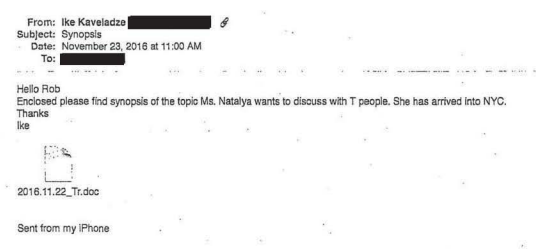
Less than an hour later, Goldstone wrote back and noted that the synopsis was largely what Veselnitskaya had presented in June.
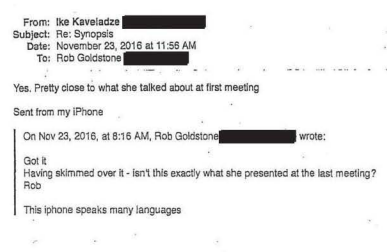
When Kaveladze pressed for a meeting, Goldstone got squirrelly, even while saying he’d speak to both Don [Jr] and Rhona after sending a synopsis.
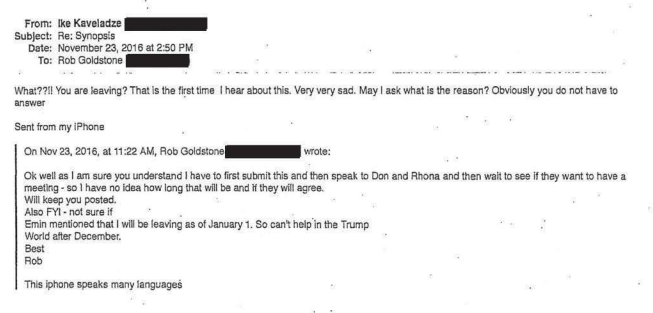
When Kaveladze followed up on November 27, Goldstone claimed he had sent materials the week before. Kaveladze suggested that this meeting could happen on the assistant or lawyer level — something both Kaveladze and Goldstone had expressed regret hadn’t happened during the summer.
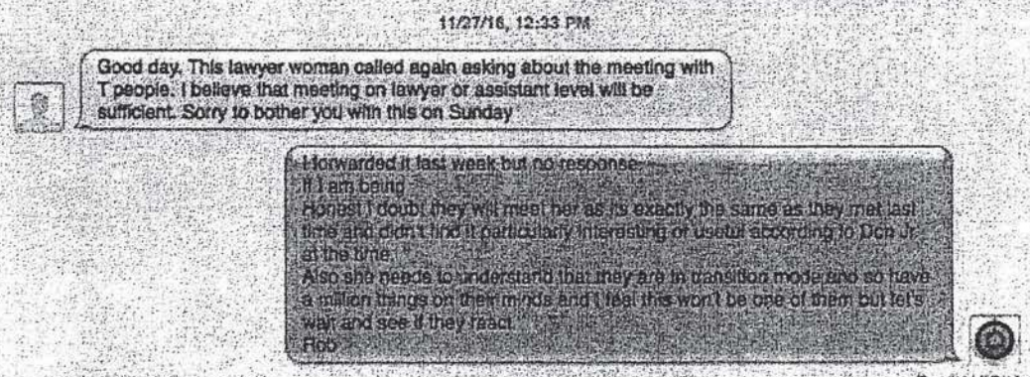
The next time Kaveladze followed up, Goldstone said that Emin might have to call directly (which Kaveladze took to mean making a call to Don Jr).

It appears only after that did Goldstone forward the synopsis to Rhona Graff, above. After which he told Kaveladze that he had “again” asked about a low level meeting.
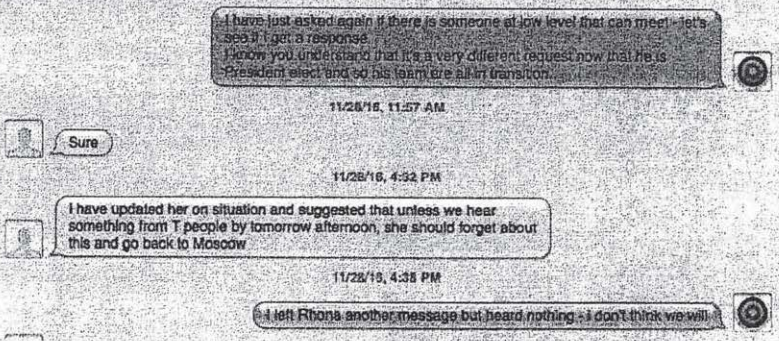
After that follow-up call, Graff forwarded Goldstone’s email to Steve Bannon (who early this year argued the June 9 meeting should have been held with lawyers, not the top campaign officials, thought without objecting to the exchange in principle), explaining that Trump knew Aras well, but that she wasn’t “sure how to proceed, if at all.”
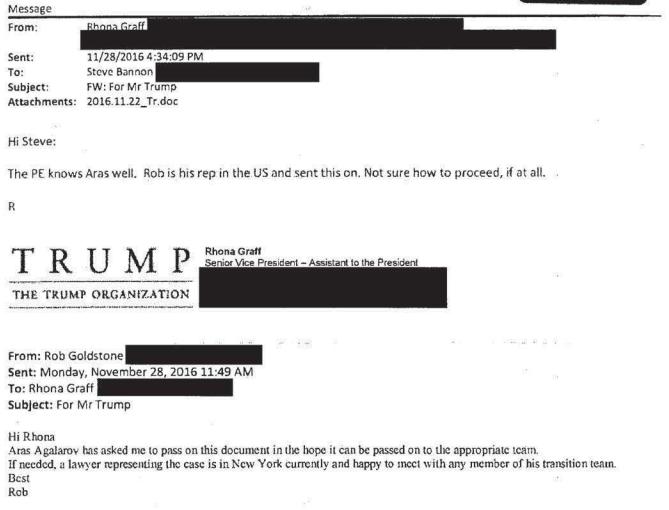
During this whole exchange, Kaveladze was juggling messages with Veselnitskaya who was in New York on Prevezon business and beginning to panic based on news reports that Trump would keep Preet Bharara on (Kaveladze would continue handling her throughout December, until handing her off to Agalarov attorney Scott Balber in January).
On November 29, he explained to Vesenitskaya that,
Robert says that logistics of organizations [sic] of meetings with Team Trump now would be difficult and lengthy. I’ve landed in Moscow. I will discuss this situation … with my boss.
Kaveladze did not explain from whom Goldstone learned that, or if it included another phone call. He had also told Goldstone he was in Moscow if he wanted to speak directly. As Kaveladze told SJC, he discusses important things with his boss face-to-face because,
Agalarov is based in Russia, and I’m pretty sure, you know, his phone is being, you know, monitored.
And that’s where, as far as we know, the Agalarov effort to follow up on the June 9 meeting, ended, with Kaveladze explaining things face-to-face to his boss. Which would make it follow-up, just unsuccessful follow-up.
At least two communications are unaccounted for
One key question about this follow-up is the role that Don Jr had in it.
None of these texts suggesting Goldstone had phone conversations with someone, probably Don Jr, as early as November 18 were turned over to SJC before Don Jr testified. Probably as a result, he was asked only about the November 28 email from Goldstone to Graff. He claims he was not aware of any part of the follow-up.
Q. It appears Mr. Goldstone continued his anti-Magnitsky effort beyond your June 9, 2016 meeting. Other than this e-mail, were you aware of any other effort he made on this issue after your meeting?
A. Not that I recall, no.
For his part, Goldstone claims he didn’t send anything before that November 28 email, in spite of telling Kaveladze, back in November 2016, that he had.
Q. So in your November 27th message to Mr. Kaveladze, you said you forwarded the information last week. The last email was an email sent on November 28th, the day after this message with Kaveladze, forwarding the document to Ms. Graff. Had you, in fact, forwarded the document the week before your November 27th message with Kaveladze?
A. I don’t recall, but because I know myself, and I know how I write , I would imagine that the minute he reminded me of it in here, I forwarded it to Rhona, probably the next day. So I don’t recall one before then, no.
Q. All right. Prior to sending that email to Ms. Graff on November 28th, 2016, did you speak with Ms. Graff or any other Trump associates about a second meeting with Veselnitskaya?
A. I don’t believe so.
Nevertheless, there are several known or reported communications unaccounted for: the one Goldstone had before November 18, any email he had the week before November 28 with the synopsis, and any follow-up call via which Goldstone would conclude that the logistics of organizing a meeting with Trump people would be difficult during the transition.
Mueller, of course, will know whether Goldstone and Don Jr communicated directly, and if so when. So he will have a sense of whether Don Jr and Goldstone’s claims, which seem to contradict contemporaneous records, are true or not.
The Russian side concludes there is no communication channel
The problem, at least as the Russian side saw it (possibly based off what Goldstone had reported back), was those logistics: a channel of communications. The next day, December 1 at 11:49AM, Kaveladze texted again (Veselnitskaya was by this point frantic because Trump had met with Preet Bharara, with her even discussing who Trump might, “Wet and not to wet” with respect to the US Attorney, which Kaveladze translated as “crush”), explaining that Aras planned on meeting with Trump to restore communications.
Unfortunately, we don’t have communication. My boss planned to meet with him. We will send a formal request. Hopefully after the meeting we will keep communication.
As far as we know, that meeting never happened. Though the Agalarov camp and the Trump camp would resume intense conversations in June 2017, as the Trump Organization began to try to understand the legal liability posed by the meeting. Trump’s lawyers would speak directly with both Kaveladze and Goldstone before Agalarov’s lawyer, Scott Balber, took over the discussions (indeed, he remained the key architect of the narrative from that point forward, probably for all sides). Those are the conversations that would lead, on July 15, Graff to remind Goldstone that he had emailed her to follow up on the June 9 meeting.
So while there was clearly follow-up, there was not a clear resolution to the June 9 meeting in which Veselnitskaya got Trump to adopt her preferred policy.
Other Russians pursue a communication channel
Unless the resolution moved to a different path.
As it happens (this may be a coincidence, or may be a sign of greater coordination that the Trump people claim they’re capable of), later on the same day after Kaveladze said his boss would seek to restore a channel of communication with Trump, Jared hosted a meeting in Don Jr’s office with Sergei Kislyak, attended by Mike Flynn. Even according to Jared’s prepared statement, that meeting was about establishing communication channels to Russia.
The meeting occurred in Trump Tower where we had our transition office, and lasted twenty-thirty minutes. Lt. General Michael Flynn (Ret.), who became the President’s National Security Advisor, also attended. During the meeting, after pleasantries were exchanged, as I had done in many of the meetings I had and would have with foreign officials, I stated our desire for a fresh start in relations. Also, as I had done in other meetings with foreign officials, I asked Ambassador Kislyak if he would identify the best person (whether the Ambassador or someone else) with whom to have direct discussions and who had contact with his President. The fact that I was asking about ways to start a dialogue after Election Day should of course be viewed as strong evidence that I was not aware of one that existed before Election Day.
The Ambassador expressed similar sentiments about relations, and then said he especially wanted to address US. policy in Syria, and that he wanted to convey information from what he called his “generals.” He said he wanted to provide information that would help inform the new administration. He said the generals could not easily come to the U.S. to convey this information and he asked if there was a secure line in the transition office to conduct a conversation. General Flynn or I explained that there were no such lines. I believed developing a thoughtful approach on Syria was a very high priority given the ongoing humanitarian crisis, and I asked if they had an existing communications channel at his embassy we could use where they would be comfortable transmitting the information they wanted to relay to General Flynn. The Ambassador said that would not be possible and so we all agreed that we would receive this information after the Inauguration. [emphasis original]
Don Jr, in his SJC testimony, is the one who revealed that this meeting took place in his own office (and therefore outside of transition space that might be more closely monitored). But he claims he didn’t attend because he was sweaty from a workout; he also claims he didn’t know about it beforehand.
Q. You mentioned during the conversation with my colleagues that you had become aware of a meeting or meetings with Ambassador Kislyak. Can you just explain like what meetings did you become aware of? When did they take place?
A. I don’t remember the exact timing of when they took place. I believe it was after we had already secured — meaning after the election, but I could be mistaken. The only reason I’m aware of it is because it occurred in my office. I came back from the gym and they were in there.
Q. So when you say after the election, you mean after November 8, 2016?
A. I believe so.
Q. Was it a meeting in December of 2016?
A. That would fit the description, yes, I believe so.
Q. So it was a meeting in Trump Tower?
A. Yes.
Q. In your office but you hadn’t known about it beforehand?
A. Correct.
Q. Do you know why they used your office?
A. It was open, I was at the gym.
Q. And who was in that meeting?
A. I believe it was Jared Kushner, the Ambassador, maybe Flynn, but I don’t remember.
Q. Anyone else, to the best of your recollection?
A. No, not that I recall.
Q. Was the meeting still ongoing when you returned?
A. I believe it was, yes.
Q. Did you go in and join the meeting?
A. No, I did not.
Q. Why not?
A. Because I didn’t know what it was about and I was sweaty from the gym.
Q. Did you ask Mr. Kushner or Lieutenant General Flynn about the meeting after?
A. No, I don’t think I did.
So Don Jr doesn’t remember any calls with Goldstone about following up on the June 9 meeting (though they likely occurred), and he says a meeting with the Russian Ambassador just happened to get scheduled into his workout window on the same day his liaison was seeking a new channel of communications.
Mind you, the subject of this attempt to set up a back channel, per Jared, would be cooperating on Syria, something I learned — from someone who played a significant role in the Russian election attack — that Trump was working on within 15 hours of the close of polls in Hawaii the day after the election.
But within short order, these very same players would shift focus of back channel communications to sanctions relief. Within weeks, Kislyak had set up a meeting with the head of a sanctioned bank, Sergey Gorkov, to meet with Jared. And shortly after that, Flynn would make a series of calls to Kislyak about delaying any response to Obama’s December 28 sanctions. This, in turn, would lead to a meeting involving Erik Prince and another sanctioned bank in Seychelles leading up to the inauguration.
Natalia Veselnitskaya never got her second meeting to pitch the end to Magnitsky sanctions, but Sergey Gorkov got a meeting.
The stakes of dissociating the June 9 meeting from any sanctions relief
By this point, Rudy’s credibility is so shot that when he makes a claim, we should assume that it (like any claim his client makes) is suspect, if not an outright lie.
As I noted above, whether or not there was follow-up on the June 9 meeting doesn’t really change whether Don Jr gleefully accepted a meeting expecting dirt from the Russian government on Hillary Clinton. He did. But in Rudy’s dodgy explanations for why the June 9 meeting isn’t criminal, he relies heavily on his claim — a claim that the Trump side has maintained since a week before Rhona Graff found the email that proved it wasn’t true — that there was no follow-up on the meeting.
But there was.
At a minimum, there were several weeks of follow-up on the Russian side, understandably trying to hold Don Jr to (what they remember as) his offer to revisit the issue of sanctions after the election. As part of that follow-up, there are hints that Don Jr was in the loop, even if both he and Goldstone can’t remember that happening.
The follow-up led by the Agalarovs was, as far as the public record indicates, inconclusive. The Agalarovs lost their communication channel (perhaps as Don Jr got sidelined), and so never did get their follow-up meeting.
But on the same day Trump’s long-time handler, Aras Agalarov, said he’d seek out a new channel of communications, Jared Kushner and Mike Flynn were sitting in Don Jr’s office, attempting to establish a back channel of communication, and solidifying a relationship that would, less than a month later, involve yet another overt act regarding sanctions relief. And that overt act — persuading Sergey Kislyak to defer any response to Obama’s new sanctions — was closely directed from Mar-a-Lago.
Update: Looks like Rudy keeps issuing bogus exonerations for Jr because Mueller is closing in on him.
Mueller may be closing in on his son Don Jr. “A lot of what Trump is doing is based on the fact [that] Mueller is going after Don Jr.,” a person close to the Trump family told me. “They’re squeezing Don Jr. right now.”
Don Jr.’s lawyer said, “I’m not going to comment.” Another person briefed on the investigation disputed the term “squeeze,” but said the Mueller team continues to ask for documents.
As I disclosed last month, I provided information to the FBI on issues related to the Mueller investigation, so I’m going to include disclosure statements on Mueller investigation posts from here on out. I will include the disclosure whether or not the stuff I shared with the FBI pertains to the subject of the post.





